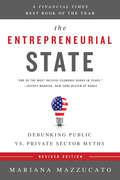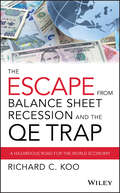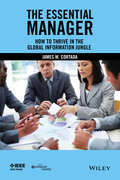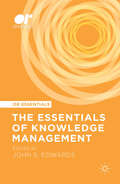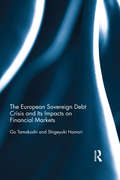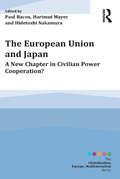- Table View
- List View
The Entrepreneurial Rise in Southeast Asia
by Stavros Sindakis Christian WalterThe Entrepreneurial Rise in Southeast Asia examines the start-up scene environments in Singapore, Malaysia, Vietnam, Thailand, and Indonesia. The contributors to this volume explore government strategies to support start-up communities, local challenges, and unique strengths of each country. They answer key questions framing policy and strategic decision-making at the firm, industry, national, and regional levels, such as: How does technological advance occur, and what are the process and institutions involved? Which cultural characteristics serve to promote or impede innovation? And, in what ways is wealth distributed or concentrated?
The Entrepreneurial State: Debunking Public vs. Private Sector Myths (Anthem Other Canon Economics Ser. #1)
by Mariana MazzucatoCompanies like Google and Apple heralded the information revolution, and opened the doors for Silicon Valley to grow into an engine of dazzling technological development, that today champions the free market that engendered it against the supposedly stifling encroachment of government regulation. But is that really the case? In this sharp and controversial expose, The Entrepreneurial State, Mariana Mazzucato debunks the pervasive myth that the state is a laggard, bureaucratic apparatus at odds with a dynamic private sector. Instead she reveals in case study after case study that, in fact, the opposite is true: the state is our boldest and most valuable innovator. The technology revolution would never have happened without support from the US Government. The breakthroughs--GPS, touch-screen displays, the Internet, and voice-activated AI--that enabled legendary Apple products to be smart successes were, in fact, all developed with support from the state. Mazzucato reveals that many successful entrepreneurs like Steve Jobs integrated state-funded technological developments into their products and then reaped the rewards themselves. The algorithm behind Google’s search engine was initially sponsored by NASA. And 75% of NMEs--new, often-ground-breaking drugs not derivative of existing substances--trace their research to National Institutes of Health (NIH) labs. The American government, it turns out, has been enormously successfully at stimulating scientific and technological advancement. But by 2009, just some months following the Great Recession--the US government, constrained by austerity measures, started disinvesting from its holdings in research fields like health, energy, electronics. The trend is likely to continue, and the repercussions of these policies could wreak havoc on our technology and science sectors. But Mazzucato remains optimistic. If managed correctly, state-sponsored development of Green technology, for instance, could be as efficacious as suburbanization & post-war reconstruction in the mid-twentieth century, and unleash a wide-spread golden age in the global economy. The limitations of natural resources and the threat of global warming could become the most powerful driver of growth, employment, and innovation within just one generation--but to be successful, the Green Revolution will depend on the initiatives of proactive governments. By not admitting the State’s role in economic and technological progress, we are socializing only the risks of investing in innovation, while privatizing the rewards in the hands of only a few businesses. This, Mazzucato argues, hurts both future of innovation and equity in modern-day capitalism. For policy-makers, Silicon Valley start-up founders, venture-capitalists, and economists alike, The Entrepreneurial State stirs up much needed debate and offers up a brilliant corrective to spurious beliefs: to thrive, American businesses have always and will need to depend on the support of our country’s most audacious entrepreneur, the state.
The Entrepreneurial University: Context and Institutional Change (Routledge Studies in Innovation, Organizations and Technology)
by Lene Foss David V. GibsonGlobal recessions and structural economic shifts are motivating government and business leaders worldwide to increasingly look to "their" universities to stimulate regional development and to contribute to national competiveness. The challenge is clear and the question is pressing: How will universities respond? This book presents in-depth case narratives of ten universities from Norway, Finland, Sweden, UK, and the U.S. that have overcome significant challenges to develop programs and activities to commercialize scientific research, launch entrepreneurial degree programs, establish industry partnerships, and build entrepreneurial cultures and ecosystems. The universities are quite diverse: large and small; teaching and research focused; internationally recognized and relatively new; located in major cities and in emerging regions. Each case narrative describes challenges overcome, actions taken, and resulting accomplishments. This volume will be of interest to policymakers and university administrators as well as researchers and students interested in how different programs and activities can promote university entrepreneurship while contributing to economic growth in developed and developing economies.
The Escape from Balance Sheet Recession and the QE Trap
by Richard C. KooCompare global experiences during the balance sheet recession and find out what is needed for a full recoveryThe Escape from Balance Sheet Recession and the QE Trap details the many hidden dangers remaining as the world slowly recovers from the balance sheet recession of 2008. Author and leading economist Richard Koo explains the unique political and economic pitfalls that stand in the way of recovery from this rare type of recession that was largely overlooked by economists. Koo anticipated the current predicament in the West long before others and issued warnings in his previous books: Balance Sheet Recession and The Holy Grail of Macroeconomics. This new book illustrates how history is repeating itself in Europe while the United States, which learnt from the Japanese experience, is doing better by avoiding the fiscal cliff. However, because of the liberal dosage of quantitative easing already implemented, the United States, the United Kingdom, and Japan may face a treacherous path to normalcy in what Koo calls the QE Trap. He argues that it is necessary to understand balance sheet recession in order to resolve the Eurozone crisis, particularly the competitiveness problems. Koo issues warnings against those who are too ready to argue for structural reforms when the problems are actually with balance sheets. He re-examines Japan's two decades of experiences with this rare recession and offers an insider view on the Abenomics. On China, readers will gain a very different historical perspective as Koo argues that western commentators have forgotten their own history when they talk about the re-balancing of the Chinese economy.Learn from Japan which experienced the same predicament afflicting the West fifteen years earlierDiscover how unwinding of quantitative easing will affect the United States, the United Kingdom, Japan, as well as the emerging worldExamine solutions to the Eurozone problems caused by two balance sheet recessions eight years apartGain insight into China's problems from the West's own experiences with urbanisationKoo, who developed the concept of balance sheet recession based on Japan's experience, took the revolution in macroeconomics started by John Maynard Keynes in 1936 to a new height. The Escape from Balance Sheet Recession and the QE Trap offers the world cure for balance sheet recession.
The Essential Bernie Sanders and His Vision for America
by Jonathan TasiniMeet the essential Bernie Sanders--an authentic and uncompromising champion of the people. Independent United States Senator Bernie Sanders--with a thirty-five-year career in public service, first as Burlington, Vermont's mayor, then as Vermont's sole representative to Congress, and currently as a United States senator--is now campaigning to become president of the United States. His goal is to build a movement to take back our country from the rich and powerful, and return it to its rightful owners--we, the American people. Sanders' common sense, populist message is resonating with Democrats, Republicans, independents, as well as ordinary working- and middle-class Americans from all walks of life, including millennials, seniors, veterans, immigrants, environmentalists, union workers, and more. In this short, accessible book, author Jonathan Tasini draws heavily from Sanders' ample public record of speeches, statements, and interviews, and couples his working-class spirit with specific legislation he has championed on a number of core proposals that comprise a broader people's agenda for America, including: A national, single-payer health care system; Free public higher education; Taking on wealth and income inequality; Preserving Social Security; Caring for our veterans; Ensuring civil rights for all; Combatting climate change; Reforming Wall Street, and much more. The Essential Bernie Sanders and His Vision for America is a must-read for anyone who shares a vision for a forward-looking, sustainable, and more just United States of America, and is eager to change the course of history.
The Essential Guide to Serial ATA and SATA Express
by David A. DemingUsed in laptop and desktop computers, low-end servers, and mobile devices, Serial ATA (Advance Technology Attachment), or SATA, is the pervasive disk storage technology in use today. SATA has also penetrated the enterprise computing environment by adding hardware components for fail-over, extending command processing capabilities, and increasing de
The Essential Keynes
by John Maynard Keynes Robert SkidelskyThe essential writings of the 20th century's most influential economist, collected in one volume Today, John Maynard Keynes is best remembered for his pioneering development of macroeconomics, and for his advocacy of active fiscal and monetary government policy. This uniquely comprehensive selection of his work, edited by Keynes's award-winning biographer Robert Skidelsky, aims to make his work more accessible to both students of economics and the general reader. All of Keynes's major economic work is included, yet the selection goes beyond pure economics. Here too are Keynes's essential writings on philosophy, social theory and policy, and his futurist vision of a world without work. As Robert Skidelsky writes in his introduction: "People talk of the need for a new Keynes. But the old Keynes still has superlative wisdom to offer for a new age."For more than sixty-five years, Penguin has been the leading publisher of classic literature in the English-speaking world. With more than 1,500 titles, Penguin Classics represents a global bookshelf of the best works throughout history and across genres and disciplines. Readers trust the series to provide authoritative texts enhanced by introductions and notes by distinguished scholars and contemporary authors, as well as up-to-date translations by award-winning translators.From the Trade Paperback edition.
The Essential Manager: How to Thrive in the Global Information Jungle
by James W. CortadaThis book discusses the evolution of management as a profession over the past two decades and how it continues to evolve. It goes on to describe the new style of management and makes recommendations for what today's and tomorrow's managers must know and how to work. Offers ways to think about your role as a manager in order to optimize your effectiveness toward uncertain and turbulent changes Discusses current realities in which management currently operates Provides a historical background of managerial practices and how they've evolved in the present workplace
The Essentials of Knowledge Management (OR Essentials)
by John S. EdwardsThis book reviews the field of Knowledge Management, taking a holistic approach that includes both "soft" and "hard" aspects. It provides a broad perspective on the field, rather than one based on a single viewpoints from Computer Science or Organizational Learning, offering a comprehensive and integrated conception of Knowledge Management. The chapters represent the best Knowledge Management articles published in the 21st century in Knowledge Management Research & Practice and the European Journal of Information Systems, with contributors including Ikujiro Nonaka, Frada Burstein, and David Schwartz. Most of the chapters contribute significantly to practise as well as theory. The OR Essentials series presents a unique cross-section of high quality research work fundamental to understanding contemporary issues and research across a range of Operational Research topics. It brings together some of the best research papers from the highly respected journals of the Operational Research Society, also published by Palgrave Macmillan.
The Essentials of Technical Communication (Third Edition)
by Elizabeth Tebeaux Sam DraggaThe Essentials of Technical Communication, Third Edition, gives students the tools they need to get their message across in today's workplace.
The Ethics of Energy Sustainability
by Pamela E. HeckelThis book is an easy to use instructional aide. Explore sustainability issues in contemporary society through a transdisciplinary approach. Chapters include ethics, public resources, public policy, combustion, heat exchangers, nuclear, solar, water, and wind energy. A short summary is presented for each topic, followed by additional topics for research, assignments, and references. The complex assignments require students to grow in their professional judgment.
The Ethics of Nuclear Energy
by Sabine Roeser Taebi, Behnam and Roeser, Sabine Behnam TaebiDespite the nuclear accident at the Fukushima Daiichi plant in Japan, a growing number of countries are interested in expanding or introducing nuclear energy. However, nuclear energy production and nuclear waste disposal give rise to pressing ethical questions that society needs to face. This book takes up this challenge with essays by an international team of scholars focusing on the key issues of risk, justice, and democracy. The essays consider a range of ethical issues, including radiological protection, the influence of gender in the acceptability of nuclear risk, and environmental, international, and intergenerational justice in the context of nuclear energy. They also address the question of when, and under which conditions, nuclear energy should play a role in the world's future supply of electricity, looking at both developing and industrialized countries. The book will interest readers in ethics and political philosophy, social and political sciences, nuclear engineering, and policy studies.
The European Commission, Expert Groups, and the Policy Process: Demystifying Technocratic Governance (European Administrative Governance)
by Julia MetzThis book challenges the assumption that policy makers' work with advisory committees is emblematic of technocratic governance. Analyzing how and why the European Commission uses expert groups in the policy process, it shows that experts not only solve technical problems, but also function as political devices and negotiators in modern governance.
The European Sovereign Debt Crisis and Its Impacts on Financial Markets
by Shigeyuki Hamori Go TamakoshiThe global financial crisis saw many Eurozone countries bearing excessive public debt. This led the government bond yields of some peripheral countries to rise sharply, resulting in the outbreak of the European sovereign debt crisis. The debt crisis is characterized by its immediate spread from Greece, the country of origin, to its neighbouring countries and the connection between the Eurozone banking sector and the public sector debt. Addressing these interesting features, this book sheds light on the impacts of the crisis on various financial markets in Europe. This book is among the first to conduct a thorough empirical analysis of the European sovereign debt crisis. It analyses, using advanced econometric methodologies, why the crisis escalated so prominently, having significant impacts on a wide range of financial markets, and was not just limited to government bond markets. The book also allows one to understand the consequences and the overall impact of such a debt crisis, enabling investors and policymakers to formulate diversification strategies, and create suitable regulatory frameworks.
The European Union and Direct Taxation: A Solution for a Difficult Relationship
by Luca CerioniWithin the European Union, direct taxation is an area which often provokes controversy due to tensions between the tax sovereignty of the individual Member States and the desire for an integrated internal market. This book offers a critical review of the legislative and case-law developments in this area at the EU level, and reviews the European Commission’s proposed solutions in light of their concerns regarding the proper functioning of the EU’s internal market. Luca Cerioni set out a series of benchmarks determined from the objectives expressed by the European Commission, including: the elimination of double taxation and double non-taxation; the simplification of cross-border tax compliance; the reduction of abusive forum-shopping practices and general aggressive tax planning strategies; legal certainty for all businesses and individuals carrying on activities and receiving income in more than one EU Member State. Cerioni uses these benchmarks to ask which Directives and/or rulings have left legal uncertainty, and which have ended up creating or increasing the scope for aggressive tax planning. The book puts forward a comprehensive solution for a new optimal regime relating to tax residence, which would contribute to the EU project to the mutual benefit of Member States and taxpayers. As a thorough and critical discussion of EU tax rules in force, and of the European Court’s case law in direct taxation, this book will be of great use to academic researchers and students of EU law, tax practitioners, and policy-makers at the EU and national level.
The European Union and Humanitarian Crises: Patterns of Intervention
by Francesca PusterlaOver the last few decades international organisations, national governments, and governmental and private actors have all multiplied their efforts to limit the extent to which natural catastrophes, man-made atrocities and political and economic breakdowns affect civil populations. The European Union and Humanitarian Crises: Patterns of Intervention addresses the allocation of foreign aid within the framework of the European Union’s Humanitarian Aid policy and analyses different Member States’ intervention strategies designed to cope with these emergencies. Joining the debate about bilateral and multilateral allocation of foreign aid in crisis situations and exploring the cooperative actions undertaken by the European Union and its Member States to cope with them the book questions how the context of the crises themselves impacts on strategies of intervention and investigates how strategies change depending on the characteristics of the crisis.
The European Union and Japan: A New Chapter in Civilian Power Cooperation? (Globalisation, Europe, Multilateralism series)
by Paul Bacon Hartmut Mayer Hidetoshi NakamuraThe EU and Japan have one of the most important trade relationships in the world. Fittingly, this book presents a detailed analysis of their bilateral regulatory environment and negotiation processes. Moreover, the two polities have also co-operated extensively in bilateral and multilateral contexts on a range of global governance issues. Nevertheless, the relationship is widely acknowledged to have significant untapped potential. Deploying the concept of civilian power, the book takes a fresh, honest and provocative look at this important relationship, in a post-Fukushima, post-sovereign debt crisis world. First the book analyses the place of EU-Japan relations within the worldviews of the Japanese and European bodies politic. Subsequently, three thematic sections evaluate their cooperation on such issues as trade, energy security, environmental politics, development, human rights, post-conflict reconstruction, health and biosecurity. The eminent scholars of the EU-Japan relationship gathered in this book offer informed, empirically rich and policy-relevant insights into the present and future prospects for the relationship.
The European Union and Supranational Political Economy (Routledge Frontiers of Political Economy)
by Guido Montani Riccardo FiorentiniThe financial crisis – originated in 2008 in the United States – had a dramatic impact on the world economy. The European Union was immediately involved, but its reaction to the crisis was clearly inadequate. The misgovernment of the European economy not only put at risk the European Monetary Union, but it also caused further hindrances to the recovery of the global economy. The global financial turmoil shook deep-rooted beliefs. The doctrine of international neo-liberalism is more and more criticized. Nevertheless, the critics of neo-liberalism focus their attention on the relationship between the state and the market, as if the nation states, with their international organisations, have enough power for an effective global governance of the world economy. The model of European supranational integration, though seriously imperfect, can suggest some new way out from the crisis – even at the world level – based on a new relationship between the supranational government of the Union and the market. In this book, several academic disciplines are involved: international economics, international political economy, international law, international relations, political theory and democratic theory. Adopting such a multidisciplinary theoretical perspective, the volume tries to answer the following question: Is a more supranational Europe able to provide a better government of the EMU? Does this reform involve more European democracy?
The European Union in Crisis
by Kyriakos N. DemetriouThis volume is a comprehensive and rigorous exploration of intertwined issues surrounding the EU's democracy and legitimacy, written in the turbulent context of the financial crisis. The chapters are woven together under four interconnected thematic sections that examine: rapidly growing national euroscepticism; the Economic Monetary Union and its legitimacy; the future of EU integration; and democratic deficit(s) across its internal & external structure. The volume presents an authoritative collection of research results and surveys by experts in various disciplines related to the EU, and is addressed to researchers and students examining EU governance, representation and accountability, as well as practitioners across a multiplicity of fields.
The European Union in a Multipolar World: World Trade, Global Governance and the Case of the WTO
by Megan DeePresenting a critical overview of what 'emerging multipolarity' means for the world's foremost global trading bloc and economic power, the European Union, this book offers new insights into how the rise of the emerging economies has impacted the EU and its role within the World Trade Organization.
The Everything Guide To Network Marketing: A Step-by-Step Plan for Multilevel Marketing Success
by Esther SpinaProven techniques for multilevel marketing success!Whether you're looking for a career change, a flexible part-time job, or a way to make money while staying home with the kids, network marketing is one of the fastest-growing business opportunities available. From services you need to products you love, there are hundreds of network marketing jobs to explore, and some are as easy as throwing a party with your closest friends. If you're willing to learn and dedicate the necessary time and energy, network marketing can help you achieve your dreams of financial independence. This step-by-step guide includes all the information you'll need to get started, including how to:Find a product you'll love selling and a company you'll enjoy working withIdentify a sponsor to help you get started and meet your goalsDevelop a personal business planImprove your marketing and sales skillsGrow and support your teamMaximize your incomePacked with expert tips and best practices from successful marketers, The Everything Guide to Network Marketing will help you achieve financial goals while helping others do the same.
The Everything Guide to Flipping Houses
by Melanie WilliamsonExpert advice to find, fix, and flip any residential property! Are you ready to capitalize on the rising real estate market and get in on the red-hot house flipping scene? You need a step-by-step guide to evaluate property, avoid rookie mistakes, and build a profitable, successful business. In The Everything Guide to Flipping Houses, successful house flipper Melanie Williamson walks you through the opportunities, the risks, the work involved, and the potential for real profits in flipping real estate. She teaches you to: Assess properties, work with contractors, and manage renovations Handle legal and tax regulations Flip multiple houses at one time Use green renovation options to keep costs low Select the right banks, investors, and real estate agents Choose marketing strategies that guarantee sales Inside you'll find detailed information for every milestone, from purchase to planning renovations to making the sale and managing profits. It's a competitive market out there, but with this guide in hand, you'll have everything you need to successfully flip any residential property--and reap the lucrative rewards.
The Everything Guide to Flipping Houses: An All-Inclusive Guide to Buying, Renovating, Selling
by Melanie WilliamsonExpert advice to find, fix, and flip any residential property!Are you ready to capitalize on the rising real estate market and get in on the red-hot house flipping scene? You need a step-by-step guide to evaluate property, avoid rookie mistakes, and build a profitable, successful business. In The Everything Guide to Flipping Houses, successful house flipper Melanie Williamson walks you through the opportunities, the risks, the work involved, and the potential for real profits in flipping real estate. She teaches you to:Assess properties, work with contractors, and manage renovationsHandle legal and tax regulationsFlip multiple houses at one timeUse green renovation options to keep costs lowSelect the right banks, investors, and real estate agentsChoose marketing strategies that guarantee sales Inside you'll find detailed information for every milestone, from purchase to planning renovations to making the sale and managing profits. It's a competitive market out there, but with this guide in hand, you'll have everything you need to successfully flip any residential property--and reap the lucrative rewards.
The Evolution of Economic and Innovation Systems
by John Foster Andreas PykaThis book is at the cutting edge of the ongoing 'neo-Schumpeterian' research program that investigates how economic growth and its fluctuation can be understood as the outcome of a historical process of economic evolution. Much of modern evolutionary economics has relied upon biological analogy, especially about natural selection. Although this is valid and useful, evolutionary economists have, increasingly, begun to build their analytical representations of economic evolution on understandings derived from complex systems science. In this book, the fact that economic systems are, necessarily, complex adaptive systems is explored, both theoretically and empirically, in a range of contexts. Throughout, there is a primary focus upon the interconnected processes of innovation and entrepreneurship, which are the ultimate sources of all economic growth. Twenty two chapters are provided by renowned experts in the related fields of evolutionary economics and the economics of innovation.

